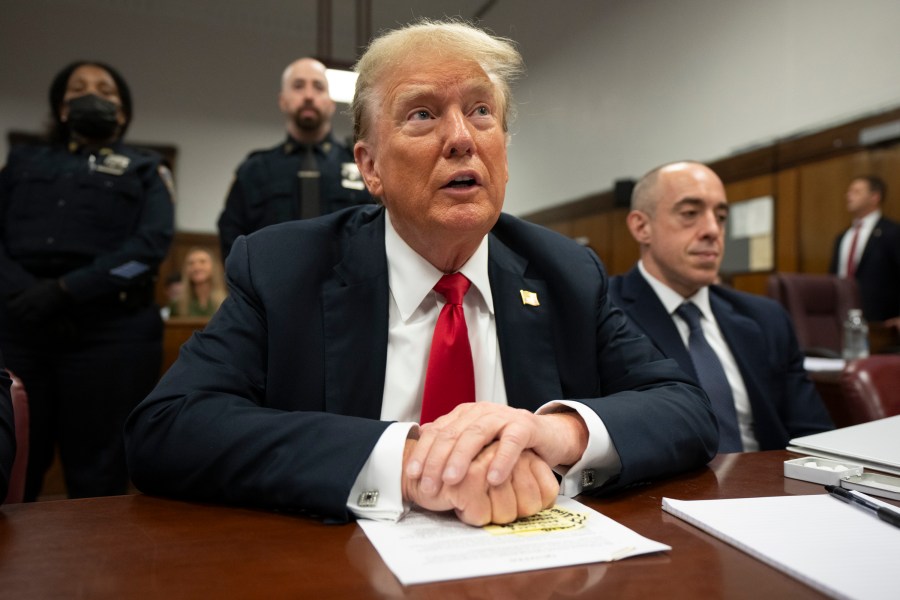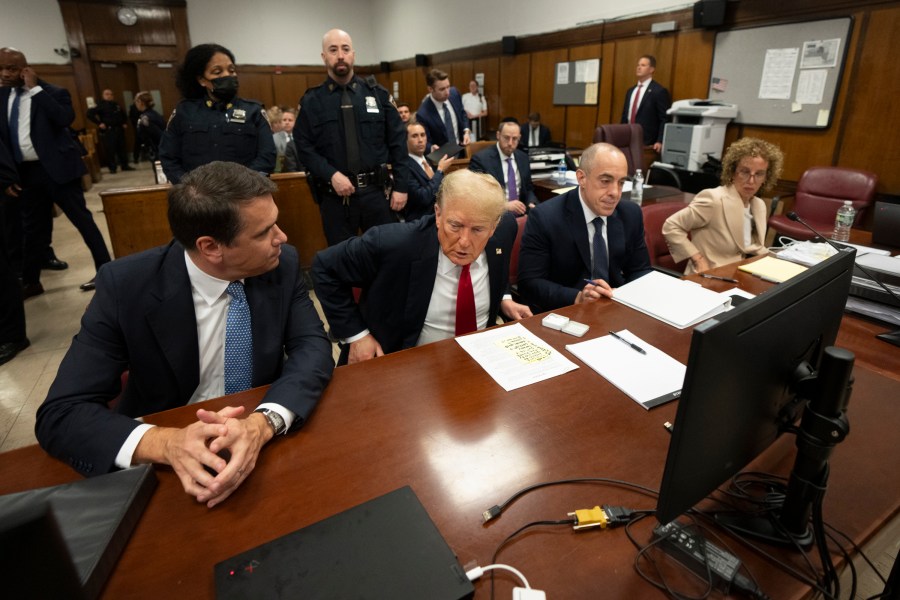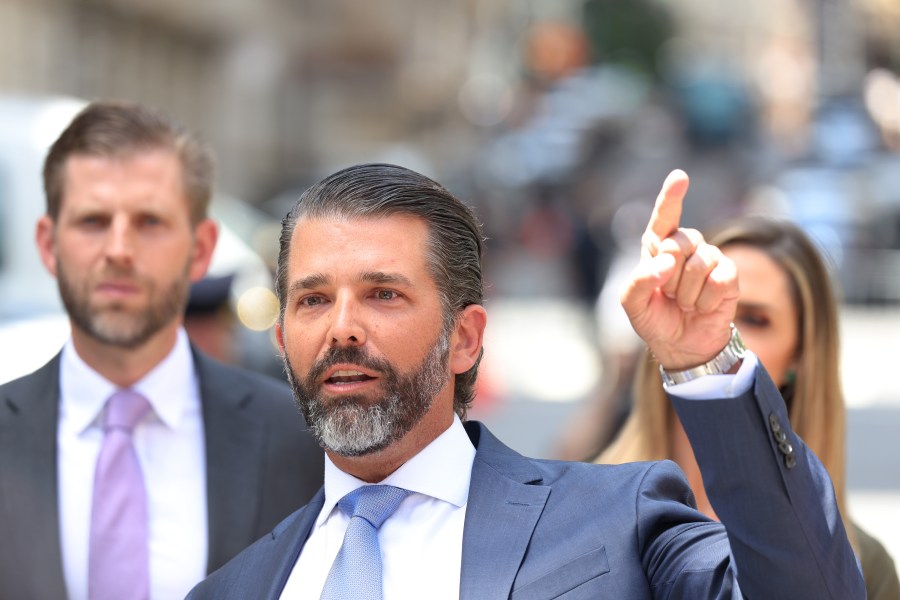NEW YORK (NewsNation) — The criminal hush money trial against former President Donald Trump began Wednesday with Judge Juan Merchan explaining to jurors the legal ins and outs that each of them needs to consider before reaching a verdict.
Merchan delivered jury instructions, which took around an hour and a half, before sending jurors to deliberate. He dismissed the jury just before 4:30 p.m. ET on Wednesday, with deliberations set to begin again at 9:30 a.m. ET on Thursday, once all jurors have arrived.
Merchan indicated schedules for future days have yet to be determined but said jurors will have the option to work past 4:30 p.m. ET if they desire but deliberations will not continue past 6 p.m ET.
Closing arguments concluded Tuesday against the former president, with prosecutors and defense attorneys having had one final opportunity to convince the jury of their respective cases before deliberations begin.
Trump, the presumptive Republican candidate for president, faces 34 criminal charges alleging that he falsified business records during the 2016 presidential election. Prosecutors allege the records were falsified to hide $130,000 in payments that were tied to porn star Stormy Daniels’ allegations that she had a sexual relationship with Trump.
Hush money payments themselves aren’t necessarily illegal but may become illegal if done in connection to another crime or as blackmail. In this case, the payments are being considered by prosecutors as illegal campaign contributions, making them a violation of campaign finance law.
Trump has maintained his innocence since being charged and has claimed he is the victim of a political witch hunt.
Jury instructions
Trump arrived at court accompanied by his son, Donald Trump Jr., and staffers, a much different escort than the large entourage that accompanied him for closing arguments. Trump entered the courtroom without speaking to reporters.
Jurors were not given written copies of the instructions but Merchan said he would read them back, in whole or in part, as many times as requested. He instructed jurors to solely examine guilt or innocence based on facts and reminded the jury not to speculate on sentences or punishment.
The jury appeared to be paying close attention to Merchan as he issued instructions, with nearly all of the jurors and alternates taking notes.
Merchan went into detail about the difference between inferences and facts and how jurors should approach those. He also stipulated things that could not be considered, including American Media, Inc. CEO David Pecker’s non-prosecution agreement and Trump’s decision not to testify.
The jury was told they could consider whether a witness had a motive to lie, has been convicted of a crime or whether a witness has an interest in the outcome of the case, while also being told they are not required to reject testimony due to a witness’s criminal conduct.
Merchan acknowledged former Trump fixer Michael Cohen as an accomplice, reminding jurors they could not convict a defendant based solely on an accomplice’s testimony unless it is corroborated by other evidence or witnesses. Jurors were also given a definition of intent, with Merchan noting that it does not require planning.
Definitions of legal terms are typically a part of jury instructions since terms like intent or conspiracy have legal meanings that may differ from how those terms are used in everyday language.
The judge instructed jurors that someone who commanded another person to commit a crime is guilty of the crime. Merchan also indicated that motive is not a necessary element of the crimes and urged jurors not to concede their beliefs out of a desire to finish deliberating.
“You should not simply make a decision because you want the trial to end or because you’re outvoted,” he warned.
Jurors were also reminded that they must be convinced beyond a reasonable doubt to find the defendant guilty and that if reasonable doubt remained, they must return a not guilty verdict.
Jurors will not be allowed to leave the jury room during deliberations and must turn cell phones over to the court during that time. They will be given a laptop containing all evidence so they may review it as needed. Merchan announced he would not be dismissing the six alternates in case there was a need for them during deliberations.
Jury deliberations
While 18 jurors were chosen, 12 will decide Trump’s fate (the other six are alternates). The jury began deliberations Wednesday, a day after closing arguments concluded.
The panel of jurors must consider each of the 34 charges against Trump and reach the same decision for the judge in the case to move forward. If the jury cannot reach the same decision, the judge could declare a mistrial.
The 34 charges Trump faces include 11 counts of falsified invoices, 12 counts of falsified general ledger entries and 11 counts of falsely recording hush money payments.
Prosecution closing arguments
On Tuesday, Merchan kept the jurors late, previously predicting the trial would run late due to the length of closing arguments. Merchan said some jurors made child care and other arrangements, allowing them to stay until 8 p.m. ET.
Attorney Joshua Steinglass delivered closing remarks for the prosecution, saying the state has presented “powerful evidence” of Trump’s guilt. He pushed back on defense arguments that a lack of definitive proof for certain events, like receipts, meant they had not happened.
Steinglass also went after the defense for “demonizing” Daniels while acknowledging her testimony was at times uncomfortable. He also admitted it was true that former Trump attorney and fixer Michael Cohen “had baggage” but said the defense was trying to have it both ways by casting doubt on actions and also acknowledging payments were made in the first place.
The prosecution’s arguments emphasized the need for jurors to examine the documents at the heart of the case. Steinglass also appealed to jurors to set aside their own personal opinions on whether Trump’s alleged affair was a big deal, arguing that voters should get to decide that for themselves rather than having information kept from them.
Steinglass claimed it was all about the election and not about protecting Melania Trump, which was Trump’s stated reason for payments to conceal the alleged affair.
Defense closing arguments
Trump attorney Todd Blanche began closing arguments Tuesday morning by telling jurors this was not a case about Trump’s alleged sexual encounter with Daniels, but rather about the business records. He also attacked the credibility of Cohen, telling jurors they could not convict Trump on Cohen’s testimony.
In his arguments, Blanche characterized Trump’s payments to Cohen as part of a retainer fee rather than a specific payment. The prosecution objected, but the objection was overruled by the judge, a win for the defense.
Addressing the prosecution’s argument regarding a conspiracy to influence the election, Blanche argued that every campaign is a conspiracy made up of a group of people working to promote a candidate. He also tried to cast doubt on the idea that a “catch-and-kill” operation orchestrated by former National Enquirer publisher David Pecker would have influenced voters.
“The idea that positive stories in the National Enquirer would influence the election is preposterous,” he said. “Millions and millions of people voted. The idea that they really thought this meeting at Trump Tower in 2015 would influence an election makes no sense.”
Blanche also cast doubt on the idea that the scheme would matter, noting that some of the allegations against Trump were already public without stories from the National Enquirer being published.
Regarding Daniels’ claims, Blanche characterized her actions as extortion, noting that she came out ahead financially. He also dismissed her testimony as designed to play to jurors’ emotions, Merchan overruling an objection from the prosecution regarding that characterization.
Blanche ended closing arguments by listing 10 reasons for reasonable doubt, which included the public nature of some stories and defense arguments that there is no evidence proving intent to defraud or Trump’s direct involvement in payments.
Trump’s family in attendance
Three of Trump’s five children attended closing arguments Tuesday.
Eric Trump and Donald Trump Jr. were back, as well as Trump’s fourth child, Tiffany Trump, and Eric’s wife, Lara Trump, who is the co-chair of the Republican National Committee.
Tiffany Trump made her first appearance in the New York court.
Three members of Trump’s immediate family have not attended any days of the trial since it began in April: His wife, Melania, daughter Ivanka Trump, and his youngest son, Barron Trump.
20-year maximum sentence
The maximum sentence Trump could face if convicted is 20 years in jail. While each felony count carries up to four years in jail, adding up to 136 years, New York law limits the sentence for this type of crime to a maximum of 20 years.
Should Trump go to prison, he won’t be going alone, as the Secret Service will have to go with him to continue his protection.
Not all first-time offenders go to jail, however, and Merchan could impose a lesser sentence, which could include fines and/or some combination of probation or community service. The fine for falsifying business records as a felony count is $5,000, though it’s not entirely clear if that would be per count, which would add up to a maximum of $170,000.
It’s also possible the jury could find Trump guilty of a lesser misdemeanor offense, which comes with the possibility of fines, probation, or up to one year in jail per count.
The jury could also return a mixed verdict, finding Trump guilty on some counts but not others, which would also impact the possible sentence.
Remaining cases against Trump
Regardless of what happens in New York, Trump is still facing two federal criminal cases and a criminal case in Georgia. However, it’s appearing increasingly unlikely that those will go to trial before the November election.
Trump’s Georgia election interference case is on hold pending Trump’s appeal of a judge’s decision to allow Fulton County District Attorney Fani Willis to remain on the case despite her romantic involvement with former prosecutor Nathan Wade. Trump’s defense team in that case argued the relationship presented a conflict of interest, and a judge ruled that either Wade or Willis had to step down from the case, which Wade did.
The federal election interference case against Trump, brought by special counsel Jack Smith, is also delayed while the Supreme Court weighs Trump’s claims that presidents should have absolute immunity from prosecution.
The court hasn’t ruled yet, but one possible outcome is for the case to be sent back to the lower courts, which would mean more delays.
Trump is also facing charges for unlawfully retaining and improperly storing classified documents after he left office. That case, also brought by Smith, has been put on indefinite hold by Judge Aileen Cannon, a Trump appointee.
Cannon cited arguments about how classified evidence should be handled as the reason, but others have blamed incompetence or accused her of making the decision to help Trump stall his cases until after the election.
2024 presidential election
Even if Trump is found guilty in one or more of these cases, he is still able to run for president. He is also eligible to run and serve even if he is in prison, though it’s not entirely clear how that would work.
Running from behind bars isn’t entirely without precedent. In 1920, socialist Eugene Debs ran for the presidency from a federal prison while serving time for sedition after urging people to resist the military draft.
The multiple criminal cases against Trump haven’t dimmed support from Republican voters, but there is polling that indicates a conviction could sway moderate and swing voters when it comes to the ballot box.
NewsNation’s Jeff Arnold, Damita Menezes, Caitlyn Becker and Laura Ingle contributed to this report.



















